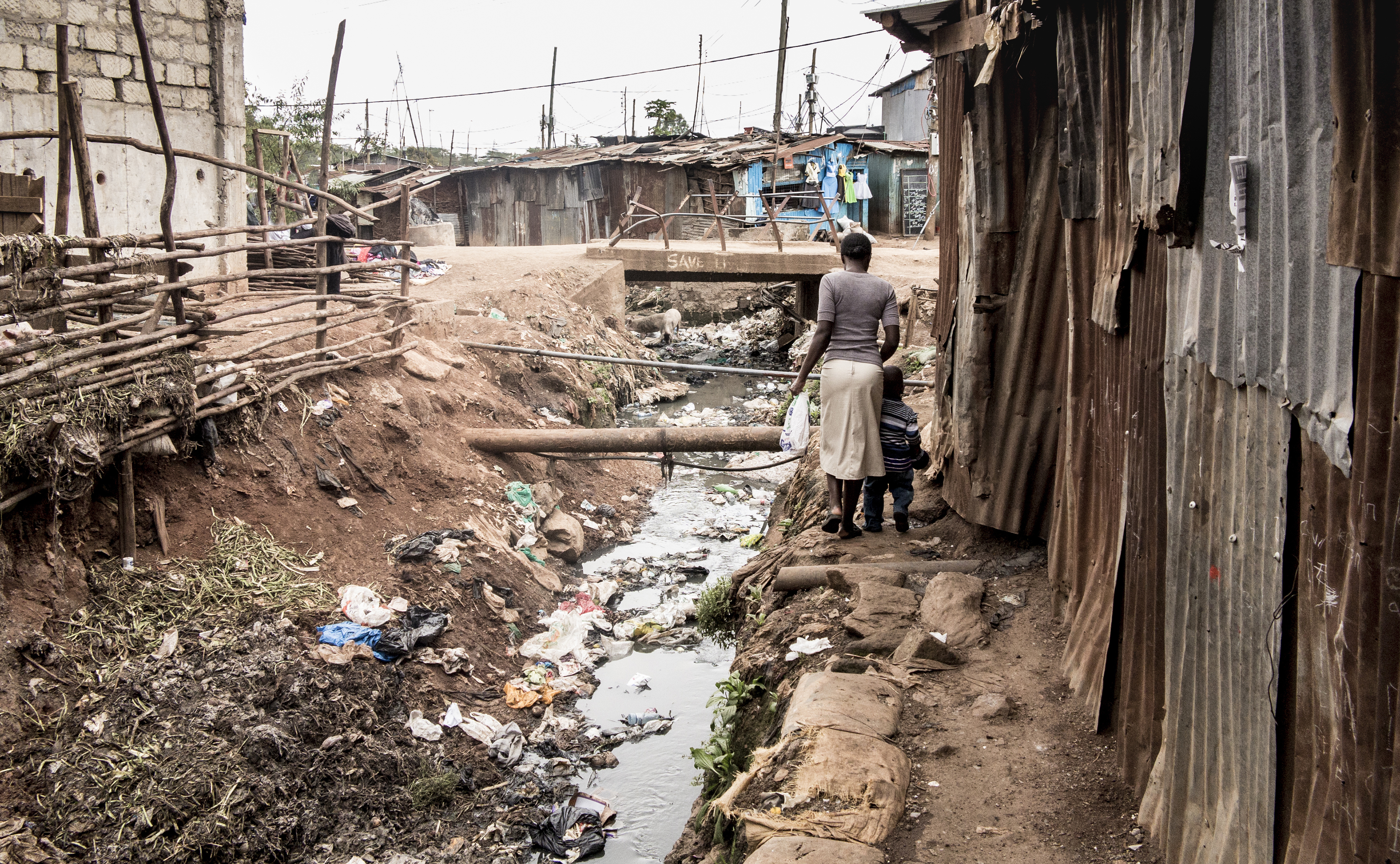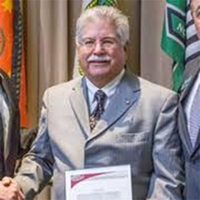
Imagine the second largest slum in Kenya, Mathare Valley slums located in Northeast Nairobi, with a population of 443,000 souls society has left behind who have no hope of a better life. Insufficient hygiene and lack of proper sanitation are everywhere. Drinking water is not available in the huts, and there is no electricity. Firewood and charcoal are used for cooking, which either exacerbates or increases the likelihood of contracting asthma and other respiratory diseases. Only 13 percent of residents have regular jobs, which continues a vicious cycle of extreme poverty. Normal male coping behavior consists of alcoholism and chronic, violent acts like robbery, smuggling, mugging and hijacking. Now, imagine young women, single mothers with children, forced to practice prostitution as the main source of income, subject to the accompanying high risk of contracting HIV/AIDS.
This is the world Elizabeth Mwai, RN, works in. As head of the Comprehensive Care Clinic for the German Doctors Nairobi-Baraka Health Centre located in the heart of the Mathare Valley slums, Mwai devotes her waking hours to the care of the marginalized and vulnerable. Of the 6,000 registered patients who seek care from the Clinic, many are afflicted by HIV/AIDS and related maladies.
A participant in Northeastern State University’s (NSU) Continuing Education Program (Broken Arrow, Okla.), Mwai is gaining knowledge and skills not only to help her patients but also to help her career. Offered through a partnership between NSU and Kenya’s HeSMA (Health Systems Management Association), the 100 percent online Healthcare Administration Certificate program – “Retooling for the 21st Century Health Delivery System” – is designed for international health professionals. All courses in the series are 8 weeks in duration, and the program typically extends through a two-to-five year period for learners.
THE EVOLUTION OF AN INNOVATIVE PROGRAM
In March 2014, Elroy Chavez, Ed.D, dean of NSU’s College of Extended Learning (CEL), and I began planning for development of an international Health Care Administration Certificate Program for health professionals that was totally online and extremely affordable. We envisioned a program where we could reach out and give back, especially to health professionals in resource poor nations. By Fall 2014, NSU CEL launched the Certificate program with two 8-week (32 hours and 3.2 CEUs) courses focused on the dramatic changes taking place in the healthcare industry, both in the United States and globally. The inaugural courses included: Healthcare Leadership for the 21st Century Health Systems and Population Health Management. By Spring 2015 we added another course, Accountable and Collaborative Care Initiatives, with the same venue as the inaugural courses.
By June 2015, a new element emerged that would bring our vision of reaching out to resource poor nations, and to Mwai in particular, into a reality. Peter Korzenik, founder and CEO of U.S.-based executive mentoring organization, Give Back Global, approached Chavez and I. Korzenik and his Kenyan partner, Frederick Kimemia, CEO of Health Systems Management Association of Kenya (HeSMA) in Nairobi, were interested in contracting with NSU CEL for continuing education courses for their members. They were intent on providing their healthcare managers, executives and physicians quality, online and affordable education in the key topic areas of leadership, management and governance (LMG) with a unique approach to online Blackboard Learn Systems.
Thanks to a tremendous collaborative effort by Chavez and his CEL team, a 6-year Memorandum of Understanding (MOU) for online health education to this African nation of 42 million was signed by NSU President Steve Turner and the leadership of HeSMA on June 28, 2015. According to Kimema, this was the first time advanced educational e-learning technology had been used in the Kenyan health sector. Just like U.S.-based online learning, it is less expensive for participants than traditional classroom learning, and it gives working professionals the flexibility to study when it is most convenient, and it fits well into their busy schedules.
The development team volunteered hundreds of hours to create a full slate of courses that are culturally sensitive to the local international population. Since the launch of the partnership, NSU has added three additional 8-week online courses that meet the goals of the LMG program in Kenya: Governance and Trustee Effectiveness, Health Quality Improvement and a Management Mini-Series (3 and 5 week courses on various specialized topics). E-textbooks provided through the Healthcare Administration Press in Chicago, Ill., are included in the tuition cost for each course so resources are on hand to learners as soon as courses are offered online. Representatives from NSU and HeSMA serve on the international program’s advisory committee to help with the evolution of this innovative program.
MEASUREMENTS OF SUCCESS
On Dec. 10, 2015, the International Learning Resources Network (LERN) honored Northeastern State University’s College of Extended Learning, Department of Continuing Education, with an award for excellence in the CEL Health Care Administration Certificate Program as the Best Programming Category. And in 2016, the international reach of NSU’s CEL program expanded to include healthcare professionals in Nigeria, Cayman Islands and Aruba, with more than 80 learners on the Continuing Education enrollment roster. Current courses now include:
- Population/Public Health Management
- Leadership for the 21st Century Health Systems
- Quality Processes Programs
- Governance and Trustee Effectiveness
- Accountable and Collaborative Care Initiatives
- Physician Group Practice Management
- Management Series for Mid-Level Executives
- Coding, Billing and Insurance Certification Series (under development)
The Certificate Program for International Learners encourages production of peer-reviewed level papers suitable for publication in professional journals and other shared resources. As an example of the quality work produced by these learners, Arinola Olajumoke and Mercy Aula recently published a scholarly paper entitled: “Africa’s Changing Disease Patterns – The Need to Pay More Attention and Strategies to Improve.” The paper was published in the inaugural issue of the African Journal of Health Information Systems (June 2016) sponsored by the Medical Records Institute of Nairobi, Kenya.
Olajumoke, who holds a B.Sc. in Biochemistry from Covenant University, Nigeria, and a Masters degree in Public Health from the University of Lagos, Nigeria, currently serves in the disease surveillance program of eHealth Africa. Aula presently works at the Public Health Department in Nashville, Tenn. She will be starting a Doctoral program August 2017. Both women attended the online Population/Public Health Management course and intended to use their article to highlight Nigeria’s progress in managing communicable diseases.
“Unfortunately, Africans have practically neglected non-communicable diseases, so we now have new disease patterns to work on like diabetes and cardiovascular issues,” Olajumoke explains.
SUPPORTING FRONTLINE HEALTH PROFESSIONALS
NSU President Turner commented that the opportunity to work with HeSMA and help educate their professional members is exactly in line with NSU’s vision and goals to forge a knowledge trust with international partners. However, the most important part of the arrangement to me is that we offer quality e-learning educational programs around the globe using state-of-the-art technology to participants who could not otherwise avail themselves of university-based continuing education courses.
NSU HCA online courses connect Oklahoma’s healthcare students with distance learning students from around the world to share ideas and to find answers to major health problems. In today’s health care environment, global relationships, thought leadership and professional collaboration are required to advance solutions to today’s pressing problems. This is especially critical in resource-poor nations like Africa. And it is especially true for health professionals like Elizabeth Mwai, who live and work front and center in the most dire health environments in the world. People like Mwai are angels because they never give up; they never lose hope; and they never stop trying to make the world a better place for everyone, especially the forgotten in the slums of Kenya’s Mathare Valley.
Note: NSU and MRI are in the process of executing a long term Memorandum of Understanding to develop a comprehensive certification curriculum for thousands of Kenyan professionals working in the areas of Medical Records and Insurance Processing, a rapidly expanding career opportunity in Kenya and other African nations.
Northeastern State University was founded on the rich educational heritage of the Cherokee Nation. NSU campuses provide its diverse communities with lifelong learning through a broad array of undergraduate, graduate and professional doctoral degree programs. With high expectations for student success, the University provides quality teaching, challenging curricula, research and scholarly activities, immersive learning opportunities and service to local and professional communities. The institution’s dedicated faculty and staff offer a service-oriented, supportive learning environment where students prepare to achieve professional and personal success in a multicultural and global society. For more information, please go to www.nsuok.edu.


